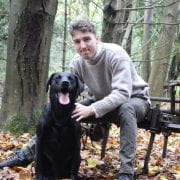Robbie Cato
Research Interests
Collaborative robotics, sensory feedback systems, smart-factories/farms, robot/automation ethics
Presentations
- “Responsible Adoption (Ethical, Legal, Social, Environmental Aspects, Considerations)” (oral) – AgriFoRwArdS CDT Summer School: Robotic Phenotyping [July 2024] – Wageningen, The Netherlands.
- “Economic Analysis & Development of Localised Controlled Environment Potato Farming Systems” (poster) – AgriFoRwArdS CDT Summer School: Robotic Phenotyping [July 2024] – Wageningen, The Netherlands.
- “Title Unknown” (oral) – Robotics & Automation Conference (Robocon) 2024 [September 2024] – London, UK.
About me
Hi I’m Robbie, my background is in robotics and automation so I’m really excited to further my knowledge and skillset at the CDT. I’m going to carry out my studies at the University of Lincoln where I did my first MSc. My main interests are human-robot interaction and autonomous decision-making / actions but I’m also really keen to explore the world of ethics and sustainability in regards to deploying robotics and autonomous systems
MSc Project
Balancing data collection awareness vs perception of trust with service robotics in public spaces
Embodied service robots with autonomous mobility and multi-modal sensors raise significant privacy and data protection concerns, often unnoticed by users. Traditional consent methods have proven ineffective at ensuring user understanding, while more interactive approaches may improve transparency and trust. This study evaluates how different data transparency and consent strategies such as no consent, standard third-party consent forms, and granular robot-driven interactive consent affect user trust and intention to use. Using the ARI robot deployed as a receptionist in a university public space, participants engage with one of the three consent approaches. User trust, acceptance, and interaction data are collected through surveys and robot logs. Findings will inform design recommendations for privacy-aware social robots and contribute to future research and development in the field.
PhD Project
Trustworthy and Explainable Robots for Agricultural Applications
As Robotics and AI technology are becoming integrated into our lives, both in professional and social environments, there is a need for better technologies to facilitate the human-robot interaction so that users can understand complex operations, collaborate effectively with robots in performing tasks and trust that the system is safe and reliable. For example, people working in farms that are becoming more reliant on automation need to be able to trust that the systems will work as intended and not cause harm to people or crops. Explainability is particularly important for situations where the system is not operating as expected by the operator (for example, because of failure) and a recovery or change In the system is required. Standards by national and international bodies are currently being developed to ensure safe and trusted operations in farming and other professional environments; these will guide the design of the proposed solutions.
This project will develop novel methods for Human-robot interaction assisting in explainability, operating and maintaining of robotic systems. These will employ Machine Learning, Program Synthesis and Large Language Models methodologies. State-of-the-art AI techniques promise greater performances in generating natural interactions with users, however there are several issues around the reliability and repeatability of the outputs they produce. This project will look at developing novel methodologies that are trustworthy, repeatable and can be relayed upon for safety critical deployments such as autonomous agricultural machines. These developments will be informed by initial research on current regulations and safety standards for autonomous systems in farms, with the support of the Douglas Bomford Trust supervision. Lab studies and real-world deployments in farms and other settings will be conducted alongside user studies to evaluate the methodologies developed and the human factors (trust, usability, explainability).
The student will develop core research skills in literature reviewing, academic paper writing and presentation, data analysis and user studies. They will learn and develop further state-of-the-art methodologies in AI (such as LLMs and reinforcement learning) and human-robot interaction.
Robbie’s PhD project is being carried out in collaboration with Douglas Bomford Trust, with primary supervision by Dr Francesco Del Duchetto.

